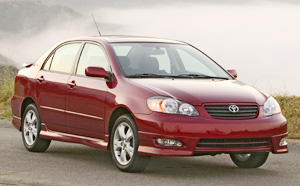
DANA POINT, CA – After four months of intensely critical media scrutiny for a 4.2 million-vehicle recall linked to unintended acceleration, Toyota Motor Corp. again is making bad news for a stalling issue involving Corolla and Matrix models.
And one top Toyota Motor Sales U.S.A. Inc. executive suggests bias has set in.
“Now that we’ve had so much reporting about the floor mats, any news on Toyota is lopsided,” Bob Carter, group vice president and general manager-Toyota Div., tells Ward’s here during a Sienna minivan preview.
Ill-fitting floor mats that jam against the accelerator pedals of Toyota vehicles have been blamed for causing sudden, unintended acceleration – a condition that led to the August deaths of an off-duty California police officer and his family.
Meanwhile, the National Highway Traffic Safety Admin. has launched an investigation into reports claiming 26 ’06 Corolla and Matrix compact cars stalled while being driven. The inquiry covers nearly 400,000 vehicles.
“I’m not discounting our responsibility here, but we’re in an atmosphere where there’s much more media interest in us,” Carter says. “Ford (Motor Co.’s cruise control recall) is many, many, many vehicles more than 4.2 million.”
Ford last month recalled 4.5 million vehicles for a faulty cruise-control deactivation switch that can overheat and catch fire. It came on top of earlier recalls for the problem, which reportedly encompass almost 12 million Ford and Mercury models.
Two deaths reportedly have been linked to the Ford recall, along with several fires.

Toyota’s response to the stalling issue is “not unusual,” Carter says, adding the auto maker also is investigating.
Toyota dealers next month will begin shaving down accelerator pedals of the models implicated in Toyota’s largest-ever recall. Pedals have been found to snag on some floor mats in ’07-’10 Camry sedans and Tundra pickups, ’05-’10 Avalon sedans and Tacoma pickups, ’04-’09 Prius sedans, ’07-’10 Lexus ES sedans, and ’06-’10 Lexus IS 250 and 350 sports sedans.
“Right now, we’re doing the (dealer) training and doing the technical manuals,” Carter says.
He says the gas-pedal fix is not complicated, nor is the training “massive.” But care is being taken to make an instructional video, with a separate video for consumers.
Toyota has said it will replace pedals beginning next April, even in vehicles that have had their pedals shortened.
Some dealers have told Ward’s they were taken aback by the Nov. 25 announcement of the pedal fix. The dealers say they were not notified previously by Toyota and struggled to answer questions from anxious consumers who flooded their phone lines.
Carter apologizes for not informing Toyota dealers sooner of the fix but says NHTSA protocol required that the governmental organization release the news first.
“We thought they were going to release it at 7 a.m., (but) they released it about 5 a.m.,” he says. “Our dealers saw it on (ABC’s) ‘Good Morning America’ and an hour later they get a letter and phone calls from us. I would have preferred to notify them first, but that’s just not how it works.”
Toyota continues to maintain ill-fitting and/or improperly installed floor mats is the sole reason for reports of unintended acceleration. “There is no greater expert on this whole subject than NHTSA,” Carter says.
In decades of investigating incidents of unintended acceleration, the most common cause discovered by NHTSA is driver error.
Toyota plans to release information in “laymen’s terms” to inform consumers of electrical-system redundancies designed to prevent unintended acceleration in its vehicles, Carter says.
Toyota finds itself on the wrong end of several lawsuits alleging faults in the auto maker’s electronic throttle-control systems.
A class-action suit against the company claims the issue of unintended acceleration is greater than the floor mat/pedal issue. California-based lawyer David Wright, whose firm, McCune Wright, filed the class-action, tells Ward’s he wants to see Toyota make brake-override technology more widely available.
“Until they do, we are not satisfied,” Wright says.
As part of its Nov. 25 announcement, Toyota said it would begin to implement the technology, which prevents loss of braking power when brake and accelerator pedals are pressed simultaneously.
Carter says the auto maker plans to have the technology on all models by ’11, but for now Toyota is focusing on retrofitting only newer Camry, Avalon, and Lexus ES and IS models.
Wright says a “significant number” of unintended acceleration complaints filed with NHTSA involved the ’02 Camry. “We don’t know why yet, but we know that’s true.”



